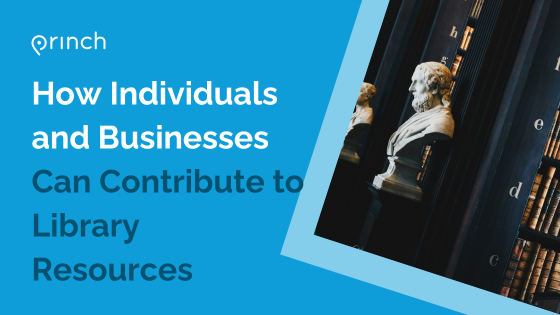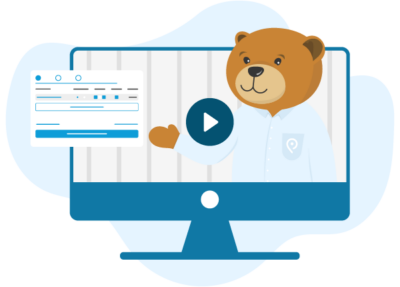In this week’s Princh Library Blog post, guest writer Sam L. Bowman explores how both individuals and businesses can practice library advocacy and contribute to their local libraries. Enjoy!
Your local library is the perfect place to connect with your community and learn more about the world around you. Volunteering with a library can enrich your life and boost your self-esteem too.
Unfortunately, some libraries are struggling, as data collected by WordsRated shows that physical visits have declined by 21% since 2009. This is largely due to the rise in digital collections and the fact that more people have access to their own personal computers. At the same time, costs associated with running a library have risen by 17.00% since 2014.
However, that doesn’t mean that libraries are doomed — they just need our support. Proper support enriches your local library and ensures that community members have a safe space to unwind and learn. Individuals and businesses that support local institutions can empower local people and help them get the support they deserve.
The Power of Libraries
Libraries provide a powerful public service for the entire community. As well as being safe, warm spaces, they usually offer free programs that are designed to empower the local population. Centers with reference materials and information rooms can help communities fight climate change, too. Libraries help communities achieve their sustainable development goals (SDG) by:
- Increasing climate change awareness by adding educational programming;
- Empowering researchers who need access to public data;
- Improve communication between stakeholders.
Well-supported libraries improve self-advocacy in the community and aid in the fight against climate change. This can be transformative in disenfranchised communities. By offering free access to data, community members can fight back against unsustainable planning initiatives, support eco-friendly schemes, and improve the livability of local areas.
Properly funded libraries offer additional services beyond books, too. A recent study published in J Community Health titled “Public Libraries: A Community-level Resource to Advance Population Health” found that four million people visit libraries every day and benefit from the health-boosting benefits of a free community institution. When leveraged correctly, libraries can:
- Improve public health messaging;
- Increase access to addiction recovery support;
- Reduce patrons’ stress;
- Help folks overcome unemployment;
- Provide important social support.
Seen in this light, libraries are more than book-lenders. They improve public health, help folks land jobs, and increase community health outcomes. As such, they’re worthy of all the advocacy that individuals and businesses can offer.
Learn the key aspects of Princh! Watch our on-demand demos at your convenience and see what makes Princh such a simple solution. Watch our demos here.
Advocating for Institutions
Advocacy for your local library is easier than ever before. If you’re interested in supporting your community, consider taking your lead from the Public Library Association, which currently supports advocacy efforts like:
- PLA Advocacy Interest Group;
- Public Libraries: Campaigns That Made a Difference;
- ALA Advocacy;
- The Edge Initiative.
These programs put you in touch with difference-makers in the larger library network. They’ll amplify your impulse to do good and will help you find funding. This is key if you want to rally against book bans, support education initiatives in the community, or make the most out of donations from individuals and businesses.
Reach out to your local library to find out more about the support they receive. Embolden their efforts by using your business’s brand to raise funds and improve access to resources. Some donations may even be tax-deductible, which means you’ll improve your bottom line while serving a noble cause.
Donations and Voluntary Work
Donating to your library is a great way to improve the resources available to the local community. This can make a world of difference if you live in a traditionally marginalized, underserved area. By donating your resources and cash to the library, you help create a more balanced, equitable environment for the community.
Whether you’re a business leader or a concerned citizen, you need to liaise with your local library before trying to donate. They may have an excess of certain items already and will need to assess whether or not they have room for your books, computers, or archives. Libraries need high-quality items and may not have the capacity to take on your used goods. If your library has to refuse your items, consider donating to worthy causes like:
- Once Upon a Child;
- Toner Buyer;
- Books for Soldiers;
- The Arc.
These charitable organizations accept similar items and are almost always in need of more donations.
If you or your business is working on a budget, consider donating your time and expertise instead. For example, if you work for a local solicitor or bank, consider offering a few hours of your time each week. This will be popular with community members who cannot usually afford your service and will empower folks to take control of their lives. With enough engagement, volunteering your time may even save your local library by increasing interest and understanding of the services it can offer.
Conclusion
Advocating for your local library can improve access to resources and help build more resilient communities. This is crucial today, as global issues like climate change threaten to further weaken underserved areas. As an individual or a business leader, you can contribute to improving resources by teaming up with national initiatives and donating your archives, time, or money. This will make a huge difference to your library and help sustain education and empowerment programs for years to come.
We will be back with another interesting article from the library world soon!
Want more insights from libraries across the world?
Subscribe to our blog to receive new library insights directly to your e-mail.
Sam L. Bowman
Sam writes about people, community, wellness and how they merge. He enjoys getting to utilize the internet for community without actually having to leave his house. In his spare time, he likes running, reading, and combining the two in a run to his local library.
Recent posts
The Future of Libraries: Navigating Digital Transformations
In this week's Princh Library Blog post, guest writer Jill Brooks discusses how libraries can navigate their digital transformation, including some of [...]
Library Spaces & Clean Air: The Impact of Printing Choices on Indoor Environment
In this week's Princh Library Blog, guest writer Nina Grant talks about something that's always present, but rarely thought about; air, or [...]
Library Advocacy: How Individuals and Businesses Can Contribute to Library Resources
In this week’s Princh Library Blog post, guest writer Sam L. Bowman explores how both individuals and businesses can practice library advocacy [...]


